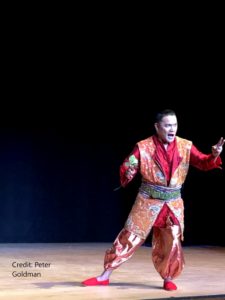
Numi Opera Review 2019: Der Zwerg
New Production Shows Great Promise For New Company in LA Opera Scene
By Gordon WilliamsLos Angeles’s new company Numi Opera launched on Thursday night May 30, putting on their first production at Downtown’s “Spanish Gothic” Ace Theatre, the former 1927 United Artists’ picture palace.
Dedicated to producing rare, even “oppressed,” works, Numi Opera is devoting their first season to producing operas by composers banned by Hitler. The Polish family of Numi’s founder Gail R. Gordon was tragically affected by events during World War II even though, according to her introduction in the program booklet, her mother and eventually her maternal grandparents made it to the United States.
Later this year Numi Opera will produce “The Ring of Polykrates” by Erich Wolfgang Korngold, who later scored Errol Flynn films (you can’t help thinking of such things sitting in the Ace Theatre). On this occasion they produced 1922’s “Der Zwerg” (The Dwarf) by Alexander Zemlinsky. It was a remarkably satisfying experience.
A Remarkable Experience
The nexus of mid-20th century America with Europe and the theme of Composers Banned by the Nazis has particular resonance for me living in Los Angeles. I know that “Der Zwerg’s” excellent librettist Georg C. Klaren worked with Hitchcock in the Silent Era (albeit on a UK-German production). Only the day before Thursday’s premiere, I had passed North Curson Avenue where the Nazi era’s consul-general Georg Gyssling once lived and entertained. And Zemlinsky’s music occupies a musical milieu I love, hailing from that moment in history when atonality ramped up to boiling point the expressive capability of tonality rather than displace it. The musical language of “Der Zwerg” reminds me of Mahler’s “The Song of the Earth” or the “Gurrelieder” of Zemlinsky’s brother-in-law Arnold Schoenberg whose family, fleeing Hitler, ended up on Los Angeles’s west side.
Zemlinsky’s original conception for “Der Zwerg” calls for a huge orchestra: triple woodwind, large percussion section, celesta, mandolin, guitar, harp. I wondered if a new company could assemble this, but Numi Opera presented “Der Zwerg” in piano reduction, albeit brilliantly covered by pianist/musical director Christopher Luthi. How would “Der Zwerg” fare with this minimum instrumentation and in the vast space of the Ace Theatre, I had wondered. But after initial adjustment and admiring the discipline and choreography of Luthi and chorusmaster Oliver Chan as they took turns at directing proceedings, I found myself concentrating intently on the stage action. There were a lot of people to maneuver on the stage in the beginning but I was immediately taken by the quality of the singing, particularly the euphony of female voices sometimes singing in as much as eight-part harmony and the antiphonal effectiveness of Ghita (Shana Blake Hill) and the three Maids (Elizabeth Queen, Adrien Roberts and Sarabeth Belon) against the chorus of Playmates.
“Der Zwerg” is based on “The Birthday of the Infanta,” a short story by Oscar Wilde. In Zemlinsky’s version the Infanta is given at dwarf for her 18th birthday. She and her playmates think of him as a mere toy. He sees himself as a hero, never having caught a reflection of himself in a mirror. The Infanta and her playmates are prepared to indulge his self-deception until he seeks a kiss from the spoilt princess and she orders Ghita, her lady-in-waiting, to show him what he actually looks like. Perhaps the only character in the whole story who grows in warmth, Ghita can’t do it, and it is only through accident that the dwarf sees himself in a looking glass and, discovering his “apparent” ugliness, dies of a broken heart.
Gordon’s production incorporated passages from Wilde’s original story. Carl Roberts, a one-time frontman for Soul and Funk bands making his first foray into opera, was a most congenial narrator. The conflation of the two versions created some interesting questions for me. While the Wilde interpolations mentioned characters who otherwise don’t appear in Zemlinsky’s version, they nicely amplified the fairytale aspect of the tale, which was further augmented by having Berta Suarez perform a dance solo during the Infanta’s party à la Russian storybook ballet.
Details Abound
I was impressed by the comic detail of baritone Roberto Perlas Gómez’s performance. He was a Hofhausmeister who while maintaining his household authority, could step down and conspire with the female playmates in their cruel fun.
Soprano Oriana Falla effectively took us through the Infanta’s process from fascination with her “gift” to disgust and ultimately to obliviousness. Zemlinsky directs the Infanta to sing her last line as “childlike and naïve.” “Ich tanze weiter” (I can keep dancing) sang Falla on discovering the dwarf was dead, tossing it off so lightly that we could truly believe she would turn so easily to the next distraction.
How to present the title character is a good question these days? I have seen a production where all the other performers wore lifts. Gordon’s dwarf wore a lurid costume, marking him out more as eccentric than “hideous.”
As Der Zwerg, Rodell Rosel nicely played up the “fish out of water” aspect to his character. You could believe that this is a story about someone who doesn’t know he’s out of his social class. You could see and hear the burning self-confidence (self-deception) beneath Rosel’s external nervousness. The detail of his characterization kept me riveted – the misplaced confident determination in “I’ll sing since I’ve achieved my goal of seeing the Princess” (to cite Linda Zoolalian’s excellent surtitles) or the ringing tone of his proclamation “Ich ein strahlender Held (radiant hero)” to the “keine” (None) almost spoken, dejectedly, when the Princess asks if he has a home. His “She gave me a white rose” monologue toward the climax was a real highlight in what was, in sum, considering all aspects of the production, a commendable start for this welcome addition to LA’s opera scene.


